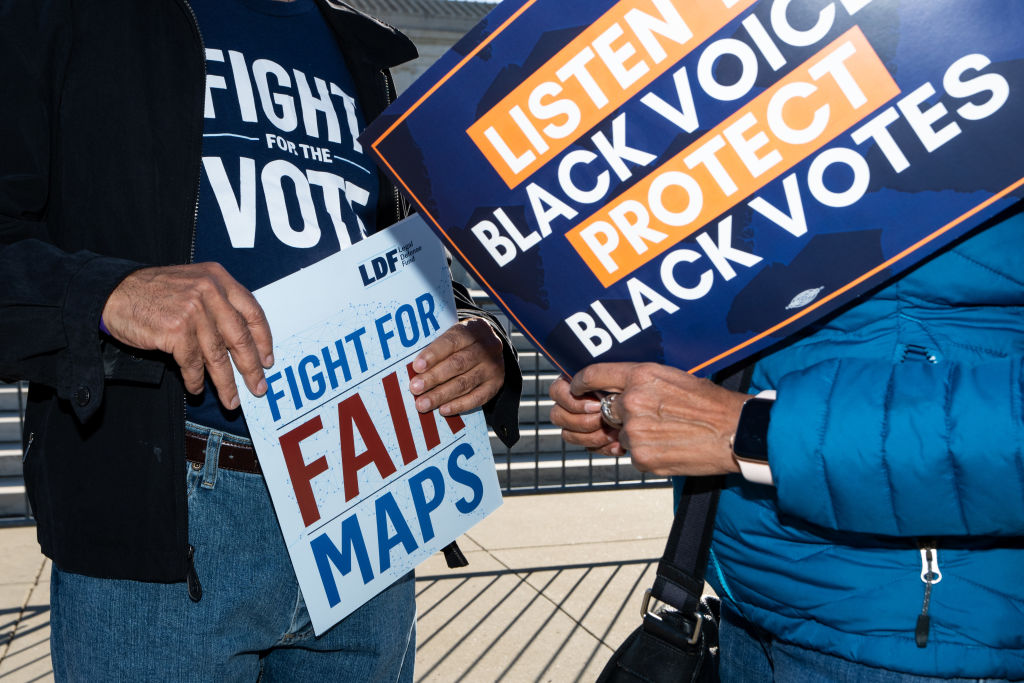If you’ve been paying attention to the world of politricks, especially over the last few years, you likely know of the trend among GOP legislators of solidifying Republican rule in their states by redistricting their congressional maps in an intentional effort to dilute Black voting power.
Source: Bill Clark / Getty
It’s a strategy that has already worked in Florida, Louisiana, and South Carolina and is currently being mulled over by judges in Texas. Surprisingly, it doesn’t appear to be working in Mississippi, which is usually one of the first states in line to celebrate and practice anti-Black oppression as an American pastime.
Last Tuesday, federal judges ordered the Mississippi Legislature to create more Black-majority House and Senate Districts after the three-judge panel ruled in favor of the plaintiffs in a lawsuit filed on behalf of the Mississippi Conference of the NAACP and Black voters from across state districts that were drawn in 2022, according to Mississippi Today.
“The court rightly held that the Mississippi Legislature used the redistricting process to dilute the power of Black voters. Those legislative districts denied Black Mississippians an equal voice in state government,” said Jarvis Dortch, executive director of the ACLU of Mississippi.
It’s still probably too early for Black voters in Mississippi to celebrate as the state can appeal the ruling to the U.S. Supreme Court, which is how South Carolina got its Jim Crow-ish voting map approved after a lower court ruled that it was “racist” and unconstitutional. Federal judges appointed by Donald Trump also overruled lower courts in Louisiana so that its segregation-inspired map could be given the green light.
State legislators can also argue in court for more time to re-draw their maps, although the judges did state in their ruling that they prefer the state make it happen “before the 2025 legislative session convenes.” According to MT, MaryAsa Lee, a spokesperson for Republican Attorney General Lynn Fitch’s office, said Fitch is currently reviewing the court’s opinion, but she did not say whether Fitch plans to appeal the decision.
Here’s a little more on that decision from MT:
The federal panel did not accept all of the arguments of the NAACP and other plaintiffs. But the panel ruled that Black-majority Senate districts should be drawn at least in the DeSoto County area in north Mississippi and in the Hattiesburg area in south Mississippi. In addition, a new Black majority House district should be drawn in the Chickasaw County area in northeast Mississippi.
The state has a Black population of about 38%. Currently there are 42-Black majority districts in the 122-member House and 15 Black majority districts in the 52-seat Senate.
Several legal and civil rights organizations were behind the lawsuit, including The Lawyers’ Committee for Civil Rights Under Law, the American Civil Liberties Union, ACLU of Mississippi, the law firm of Morgan, Lewis & Bockius, and the Mississippi Center for Justice as well as civil rights attorney Carroll Rhodes.
“This ruling affirms that the voices of Black Mississippians matter and should be reflected in the state Legislature,” said Jennifer Nwachukwu, of the Lawyers’ Committee.
Rob McDuff, an attorney with the Mississippi Center for Justice, shared similar sentiments, saying, “This ruling brings us much closer to the goal of ensuring that Mississippi has a fair number of majority-Black legislative districts to go along with the majority-white ones.”
Because that’s equality, ain’t it?
If you’ve been paying attention to the world of politricks, especially over the last few years, you likely know of the trend among GOP legislators of solidifying Republican rule in their states by redistricting their congressional maps in an intentional effort to dilute Black voting power.
Source: Bill Clark / Getty
It’s a strategy that has already worked in Florida, Louisiana, and South Carolina and is currently being mulled over by judges in Texas. Surprisingly, it doesn’t appear to be working in Mississippi, which is usually one of the first states in line to celebrate and practice anti-Black oppression as an American pastime.
Last Tuesday, federal judges ordered the Mississippi Legislature to create more Black-majority House and Senate Districts after the three-judge panel ruled in favor of the plaintiffs in a lawsuit filed on behalf of the Mississippi Conference of the NAACP and Black voters from across state districts that were drawn in 2022, according to Mississippi Today.
“The court rightly held that the Mississippi Legislature used the redistricting process to dilute the power of Black voters. Those legislative districts denied Black Mississippians an equal voice in state government,” said Jarvis Dortch, executive director of the ACLU of Mississippi.
It’s still probably too early for Black voters in Mississippi to celebrate as the state can appeal the ruling to the U.S. Supreme Court, which is how South Carolina got its Jim Crow-ish voting map approved after a lower court ruled that it was “racist” and unconstitutional. Federal judges appointed by Donald Trump also overruled lower courts in Louisiana so that its segregation-inspired map could be given the green light.
State legislators can also argue in court for more time to re-draw their maps, although the judges did state in their ruling that they prefer the state make it happen “before the 2025 legislative session convenes.” According to MT, MaryAsa Lee, a spokesperson for Republican Attorney General Lynn Fitch’s office, said Fitch is currently reviewing the court’s opinion, but she did not say whether Fitch plans to appeal the decision.
Here’s a little more on that decision from MT:
The federal panel did not accept all of the arguments of the NAACP and other plaintiffs. But the panel ruled that Black-majority Senate districts should be drawn at least in the DeSoto County area in north Mississippi and in the Hattiesburg area in south Mississippi. In addition, a new Black majority House district should be drawn in the Chickasaw County area in northeast Mississippi.
The state has a Black population of about 38%. Currently there are 42-Black majority districts in the 122-member House and 15 Black majority districts in the 52-seat Senate.
Several legal and civil rights organizations were behind the lawsuit, including The Lawyers’ Committee for Civil Rights Under Law, the American Civil Liberties Union, ACLU of Mississippi, the law firm of Morgan, Lewis & Bockius, and the Mississippi Center for Justice as well as civil rights attorney Carroll Rhodes.
“This ruling affirms that the voices of Black Mississippians matter and should be reflected in the state Legislature,” said Jennifer Nwachukwu, of the Lawyers’ Committee.
Rob McDuff, an attorney with the Mississippi Center for Justice, shared similar sentiments, saying, “This ruling brings us much closer to the goal of ensuring that Mississippi has a fair number of majority-Black legislative districts to go along with the majority-white ones.”
Because that’s equality, ain’t it?
If you’ve been paying attention to the world of politricks, especially over the last few years, you likely know of the trend among GOP legislators of solidifying Republican rule in their states by redistricting their congressional maps in an intentional effort to dilute Black voting power.
Source: Bill Clark / Getty
It’s a strategy that has already worked in Florida, Louisiana, and South Carolina and is currently being mulled over by judges in Texas. Surprisingly, it doesn’t appear to be working in Mississippi, which is usually one of the first states in line to celebrate and practice anti-Black oppression as an American pastime.
Last Tuesday, federal judges ordered the Mississippi Legislature to create more Black-majority House and Senate Districts after the three-judge panel ruled in favor of the plaintiffs in a lawsuit filed on behalf of the Mississippi Conference of the NAACP and Black voters from across state districts that were drawn in 2022, according to Mississippi Today.
“The court rightly held that the Mississippi Legislature used the redistricting process to dilute the power of Black voters. Those legislative districts denied Black Mississippians an equal voice in state government,” said Jarvis Dortch, executive director of the ACLU of Mississippi.
It’s still probably too early for Black voters in Mississippi to celebrate as the state can appeal the ruling to the U.S. Supreme Court, which is how South Carolina got its Jim Crow-ish voting map approved after a lower court ruled that it was “racist” and unconstitutional. Federal judges appointed by Donald Trump also overruled lower courts in Louisiana so that its segregation-inspired map could be given the green light.
State legislators can also argue in court for more time to re-draw their maps, although the judges did state in their ruling that they prefer the state make it happen “before the 2025 legislative session convenes.” According to MT, MaryAsa Lee, a spokesperson for Republican Attorney General Lynn Fitch’s office, said Fitch is currently reviewing the court’s opinion, but she did not say whether Fitch plans to appeal the decision.
Here’s a little more on that decision from MT:
The federal panel did not accept all of the arguments of the NAACP and other plaintiffs. But the panel ruled that Black-majority Senate districts should be drawn at least in the DeSoto County area in north Mississippi and in the Hattiesburg area in south Mississippi. In addition, a new Black majority House district should be drawn in the Chickasaw County area in northeast Mississippi.
The state has a Black population of about 38%. Currently there are 42-Black majority districts in the 122-member House and 15 Black majority districts in the 52-seat Senate.
Several legal and civil rights organizations were behind the lawsuit, including The Lawyers’ Committee for Civil Rights Under Law, the American Civil Liberties Union, ACLU of Mississippi, the law firm of Morgan, Lewis & Bockius, and the Mississippi Center for Justice as well as civil rights attorney Carroll Rhodes.
“This ruling affirms that the voices of Black Mississippians matter and should be reflected in the state Legislature,” said Jennifer Nwachukwu, of the Lawyers’ Committee.
Rob McDuff, an attorney with the Mississippi Center for Justice, shared similar sentiments, saying, “This ruling brings us much closer to the goal of ensuring that Mississippi has a fair number of majority-Black legislative districts to go along with the majority-white ones.”
Because that’s equality, ain’t it?
Comments
Bossip Comment Policy
Please read our Comment Policy before commenting.
If you’ve been paying attention to the world of politricks, especially over the last few years, you likely know of the trend among GOP legislators of solidifying Republican rule in their states by redistricting their congressional maps in an intentional effort to dilute Black voting power. It’s a strategy that has already worked in Florida, Louisiana, Bossip





